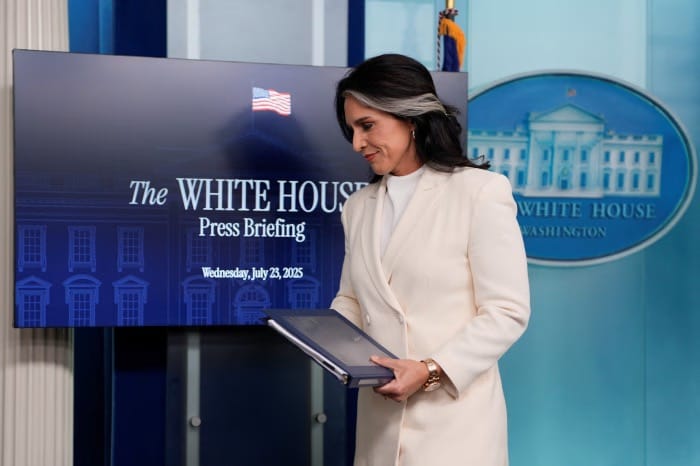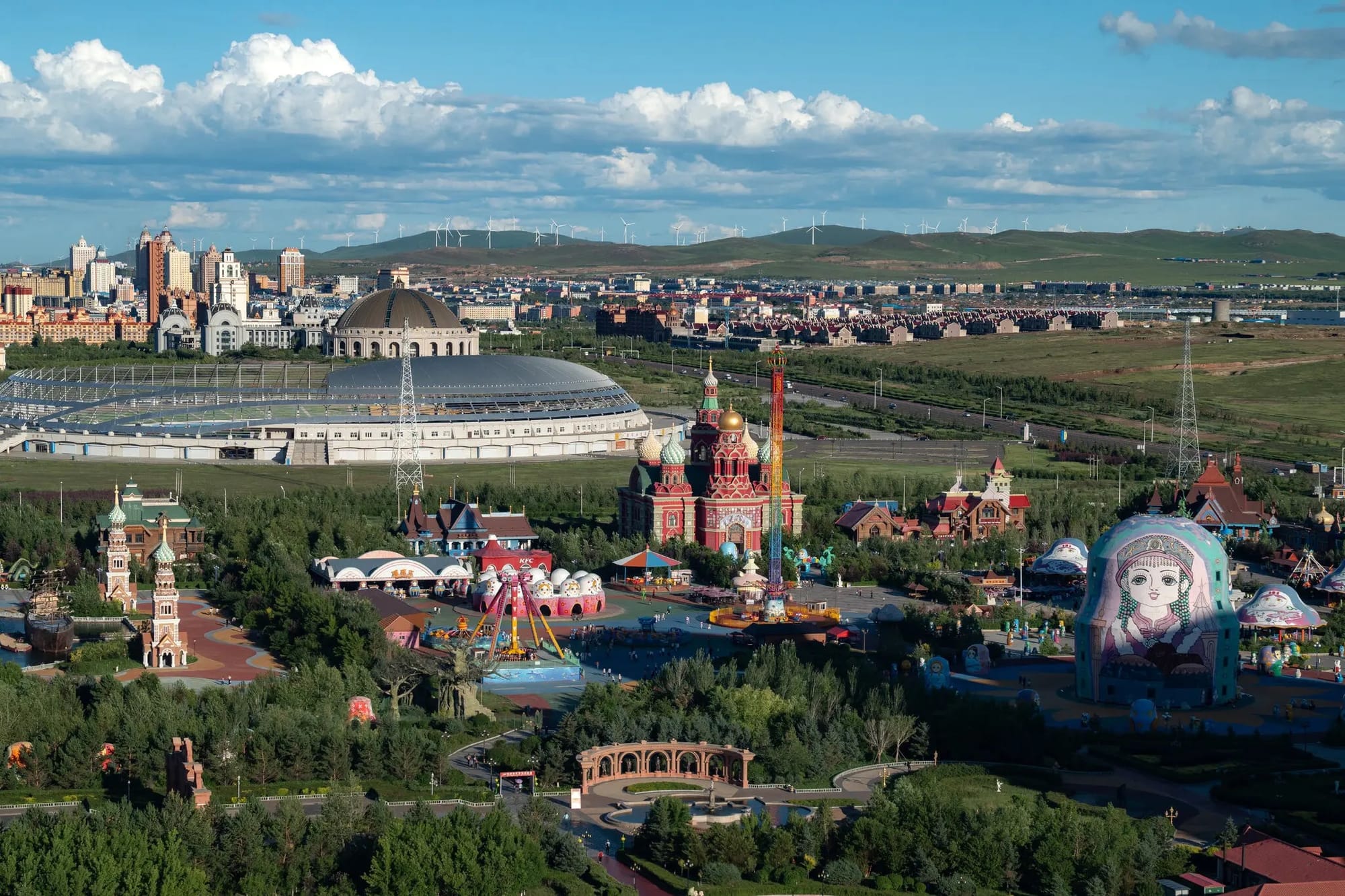July 24 2025
White House-Obama feud; Global trade template?; Columbia settles with Trump; Pittsburgh dims lights; China-Russia trade booms

White House Escalates Feud, Alleging Obama Falsified 2016 Election Intelligence
Trump's Global Trade Push Advances With Potential EU, Japan Pacts
Columbia to Pay $221 Million to Settle Federal Probes, Restore Research Grants
Pittsburgh Dims the Lights to Save Money and Tackle Light Pollution
Booming Russia Trade Puts China at Odds With European Partners
Newsletter sponsor

1. White House Escalates Feud, Alleging Obama Falsified 2016 Election Intelligence
A. WASHINGTON—Director of National Intelligence Tulsi Gabbard and the White House continued a multiday barrage against Barack Obama, alleging the former president and senior officials in his administration manufactured a false conspiracy suggesting Russia interfered in the 2016 election to undermine President Trump’s victory. Multiple investigations by Congress and the intelligence community have concluded that Russia interfered in the 2016 election to sow confusion among the American electorate and that the Russians favored a Trump victory over Hillary Clinton.Gabbard said at a White House press briefing Wednesday that she has new information indicating that then-President Obama was closely involved in interfering in an effort to undermine Trump and said that she had referred Obama to the Justice Department for potential criminal prosecution. “There is irrefutable evidence that details how President Barack Obama and his national security team directed the creation of an intelligence community assessment that they knew was false,” Gabbard said, calling the idea that Russia interfered with the 2016 election a “contrived narrative.” Declassified information Gabbard released Friday showed that Obama in December 2016 ordered a comprehensive intelligence assessment of Russia’s efforts to influence the election, yet didn’t appear to provide evidence that Obama ordered it to reach a particular conclusion. Obama spokesman Patrick Rodenbush said on Tuesday that the allegations were “bizarre” and “a weak attempt at distraction,” and said: “Nothing in the document issued last week undercuts the widely accepted conclusion that Russia worked to influence the 2016 presidential election but didn’t successfully manipulate any votes.”
B. The Justice Department announced on Wednesday the formation of a task force to look into unsubstantiated allegations by President Trump that President Barack Obama and his aides ordered an investigation into the 2016 Trump campaign’s connections to Russia to destroy Mr. Trump.
WSJ, NYT
2. Trump's Global Trade Push Advances With Potential EU, Japan Pacts
President Trump’s push to introduce a new standard for global trade is coming into sharper focus as U.S. and European Union officials converge on a possible 15% tariff deal, which could come on the heels of a similar agreement with Japan. Taken together, the two developments represent a turning point in months of global trade negotiations that have stoked uncertainty among investors and America’s biggest trading partners. Much remains unsettled one week before Trump’s self-imposed Aug. 1 deadline for reaching trade deals with other countries. Deals with two of the U.S.’s largest trading partners, Canada and Mexico, haven’t been reached and those countries face getting slapped with 35% and 30% tariffs, respectively, if deals aren’t struck before next week. Tariffs of 25% currently apply to both countries, with exemptions for certain products.
WSJ
3. Columbia to Pay $221 Million to Settle Federal Probes, Restore Research Grants
Columbia University reached a deal with the Trump administration, ending a confrontation that disrupted U.S. higher education and sparked a contentious renegotiation of academia’s relationship to the federal government. As part of the deal, Columbia will pay $200 million to the federal government over three years to settle allegations the school violated antidiscrimination laws. The school also agreed to settle investigations brought by the U.S. Equal Employment Opportunity Commission for $21 million. In return, the Trump administration will restore nearly all of the hundreds of millions of dollars in research grants it had pulled from Columbia back in March. The New York City school will also be able to access federal funding in the future.
WSJ
4. Pittsburgh Dims the Lights to Save Money and Tackle Light Pollution
One recent night in July, Denny Robinson, a project manager for the City of Pittsburgh, stood on a street corner in the North Side, lit up by newly installed streetlights, fiddling with his phone. “Let’s dim it down to 24 percent,” Mr.Robinson said, sliding his thumb across the phone’s screen. Four nearby streetlights softened to a gentle glow, eliciting oohs and aahs from a small group of onlookers gathered to behold the wonders of municipal mood lighting. Pittsburgh is replacing most of its streetlights — more than 33,000 inefficient high-pressure sodium lamps — with LED versions that are projected to save about $942,000 a year in energy costs while tackling light pollution. The old lights cast an orange glow that bathed the heavens and anything nearby in what Flore Marion, the city’s assistant director of sustainability and resilience, described as “horror-movie” lighting. The new lights are directed downward and emit warmer light than many LEDs. Compared with the old orange lights, the new lights appear brighter when fully turned up, but shields can be added to the fixtures to curb what is known as “light trespass.” Mr. Robinson said he also plans to dim the new lights between 11 p.m. and 4 a.m., which will save energy and money, and, according to the city, cause less harm to migratory birds, urban wildlife and humans. Thanks to urbanization and electrification, light pollution is growing globally by nearly 10 percent a year, according to a 2023 study. Many areas are overlit, which wastes energy,obfuscates starry skies and messes with the circadian rhythms of plants, wildlife and people.
NYT
5. Booming Russia Trade Puts China at Odds With European Partners
Trainloads of Siberian lumber cross China’s border, ready to be sliced and polished into furniture components and chopsticks. Truckloads of Russian rapeseed come across to be crushed for canola oil. And at a palatial used car showroom, Russians buy late-model used cars to send back to their hometowns. As is visible in Manzhouli, China’s main border crossing with Russia, the two countries’ economies are increasingly intertwined. China is the biggest buyer of Russian oil, timber and coal, and it will soon be the biggest buyer of Russian natural gas. Trade between the two countries exceeded $240 billion last year, up two-thirds since Russia invaded Ukraine in February 2022. China has supplied many of the drones and drone components used by Russia in the conflict. China’s staunch support for Russia’s economy has helped Moscow survive: Dozens of countries have barred Russia from much of the global financial system, upending its economy at home. China has had the opposite reaction to Russia’s war on Ukraine. “China-Russia relations represent the most stable, mature and strategically significant major-country relationship in the world today,” Wang Yi, China’s foreign minister, said this month after meeting Foreign Minister Sergey V. Lavrov of Russia. By backing Russia so enthusiastically, China’s leaders have put new strain on their country’s relationship with the European Union. If Beijing had distanced itself from Moscow, Europe might have turned toward China as President Trump threatened tariffs on European goods this year. European Union leaders met with Chinese officials on Thursday for a summit in Beijing. They were expected to ask again that Xi Jinping, China’s top leader, reduce China’s economic and industrial support for Russia’s war in Ukraine. Ursula von der Leyen, the president of the European Commission,said this month that China’s stance on the war in Ukraine would be “a determining factor” for the bloc’s relations with Beijing.

NYT
July 24, 1847: Religious pioneers settle Salt Lake Valley
After 17 months and many miles of travel, Brigham Young leads 148 pioneers into Utah’s Valley of the Great Salt Lake. Gazing over the parched earth of the remote location, Young declared, “This is the place,” and the pioneers began preparations for the thousands of followers of The Church of Jesus Christ of Latter-day Saints (also known as Mormons) who would soon come. Seeking religious and political freedom, the Latter-day Saints began planning their great migration from the east after the murder of Joseph Smith, the Christian sect’s founder and first leader.
Sign up for local news delivered to your inbox in:
Many more cities coming soon!
Sponsors (click me!)





See the citizen journal Podcast! Released on Apple, Spotify and YouTube around 10a CST.
SUBSCRIBE TO GET THE CITIZEN JOURNAL IN YOUR INBOX - FREE!
subscribe/unsubscribe to city emails, subscribe to app notifications, get the app
Sources
- https://www.wsj.com/politics/policy/tulsi-gabbard-obama-russia-8315b420?mod=hp_lead_pos5
- https://www.nytimes.com/2025/07/23/us/politics/trump-russia-obama-gabbard.html
- https://www.wsj.com/economy/trade/trump-trade-deal-15-percent-tariffs-16aeb256?mod=hp_lead_pos3
- https://www.wsj.com/us-news/education/columbia-reaches-deal-with-trump-administration-to-restore-federal-funds-2e3cfdc6?mod=hp_lead_pos1
- https://www.nytimes.com/2025/07/22/climate/pennsylvania-pittsburgh-light-pollution.html
- https://www.nytimes.com/2025/07/24/business/manzhouli-china-russia-economy.html
Contact: greg@citizenjournal.us

